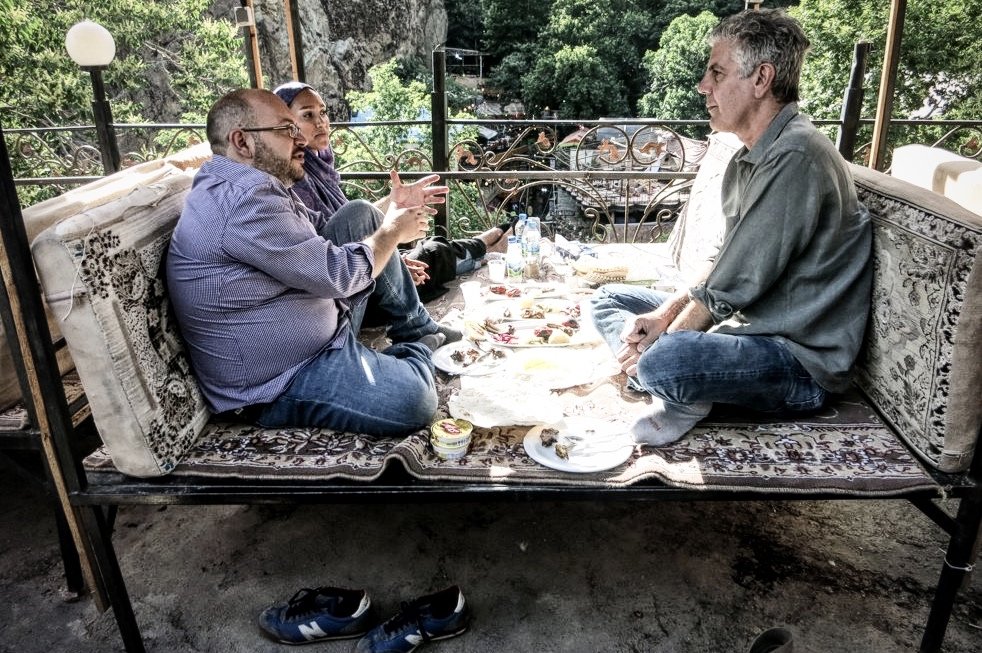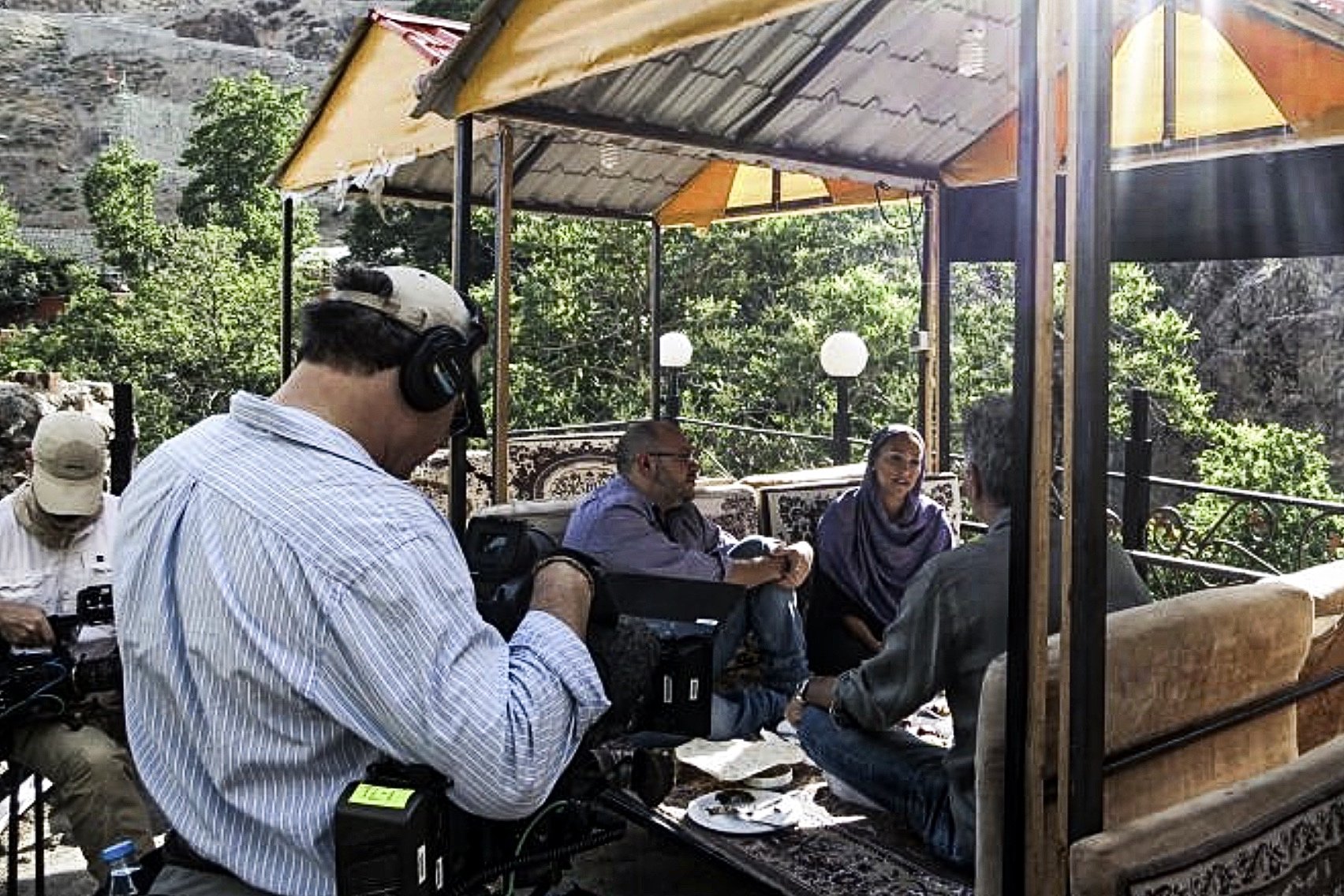“Good to be here… finally. It’s taken some time ... like, a lot of time ... like, four years I’ve been trying. Finally.” This was Anthony Bourdain in Iran, “a big blank spot on nearly every traveller’s resume.”
It was never just about the travel, or even the food.
Anthony Bourdain was always after some kind of deeper meaning, even if he — he of all people — struggled at times to find the right words. For someone who kept to much to himself that was personal, Parts Unknown opened the wider world to countless people from all races and all cultures across the globe, to not just other cultures but a different way of thinking. “The journey is part of the experience, an expression of the seriousness of one’s intent,” he once said. “One doesn’t take the A train to Mecca.”
That’s why one episode of Parts Unknown in particular resonates to this day.
Iran premiered on the 2nd of November in 2014. Still, within the first 10 minutes of the program, it is clear — even if it may not have been clear to Bourdain or his hosts Jason Rezaian, at the time the Washington Post’s Tehran correspondent, and Rezaian’s Iranian-born journalist wife Yeganeh Salehi during their long lunch together at a sitdown eaterie in the mountains overlooking the outskirts of Tehran.
Over chelo-kebabs, saffron rice and flatbread, Bourdain recalled in a pithy — and exquisitely personal — op-ed in the Washington Post, weeks after he and his producer/director Tom Vitale, cameraman Zach Zamboni and other ZPZ crew members had returned home, but weeks before the episode aired on CNN.
“There was a family mood to the afternoon,” Bourdain recalled, “parents with children, older couples and teenagers — all happy to be at leisure on a beautiful day.
“They delighted in pointing out for our cameras all the names of dishes which had originated in Persia (kebab, biryani, etc.),” Bourdain wrote in a pithy — and personal — op-ed in the Washington Post in August that year. “There was a family mood to the afternoon, parents with children, older couples and teenagers — all happy to be at leisure on a beautiful day.”
As was Bourdain’s habit — and, remember, journalists do like to talk, at least those journalists eager to share with the world what they have learned about life and life’s deeper meanings — the conversation took on a life of its own and broadened and widened to include Bourdain’s curiosity about one of the world’s oldest cultures and the unique part in history ancient Persia and present-day Iran alike have played owing to its geographical, spiritual, political and culinary location between East and West.
“They acknowledged the difficulties of living in a nation very different from the United States, where they had last lived,” Bourdain wrote.
“But they were clearly in love with Tehran, and they spoke respectfully and affectionately of the country they lived in. They had not let the difficulties of reporting for an American newspaper get them down — and they did their best to explain what, for outsiders, would appear inexplicable. At one point, I asked if they planned to move back to the States any time soon. No, they told me, because it was so easy to love the city and the country. This feeling, they said, was widely shared. They were content. They were not agents provocateurs.”
One has to understand that to get to this point in the program — and this is just 10 minutes in, remember — Bourdain and Vitale needed to introduce first-time viewers possibly unfamiliar with Iran and why it has played such a seemingly outsized role in the news headlines, then and now. told the history of Iran in the style of one of those Academy Award-winning short films, drawn in jittery, scratchy charcoal-and-ink stick figures while a small girl tells the story of Iran’s modern-day history in a halting, lilting child’s voice, a story told from a child’s point of view in a style reminiscent of then 11-year-old child activist and Nobel Peace Prize laureate Malala Yousafzai in David Guggenheim’s 2015 animated film He Named Me Malala.
“Once upon a time, there was an ancient kingdom where they found a lot of magical black stuff under the ground. But two other kingdoms had the key to the magical black stuff. And when they wouldn't share, the people of the ancient kingdom got mad.
“They voted, and their leader said the magical black stuff is ours to keep. But the other kingdoms were afraid of losing all of the magical black stuff, so they gave money to some bad men to get rid of the leader. They put back in power another leader. And they gave him money, too.
“To some, he was a good king. But to others, he could be very cruel. After many years the people of the kingdom got mad. This time, even madder. So they scared the king away forever.
“And then things started to get really messed up.”
“OK,” Bourdain says simply in the program, in voiceover.
“OK, that’s a simplistic and incomplete way to sum up the last 100-odd years of Iranian history. But the point is there were a lot of issues and differing agendas leading up to the explosion of rage known as the Iranian hostage crisis.
“Look, we know what Iran the government does. George W. Bush famously called them part of the Axis of Evil. Their proxies in Iraq have done American soldiers real harm. There was no doubt of this.
“But I hope I can be forgiven for finding these undeniable truths hard to reconcile with how we are treated on the streets everywhere we go.”
Because, as Bourdain noted in his show-opening voiceover, “I am so confused. It wasn't supposed to be like this.
“Of all of the places, of all the countries, all the years of travelling, it's here in Iran that I am greeted most warmly by total strangers. The other stuff is there: the Iran we've read about, heard about, seen in the news. But this -- this, I wasn't prepared for.”
And the food!
“So forget about the politics if you can, for a moment. How about the food? The food here is amazing.
Chelo-kabob is as close as you get to a national dish and the king of kabobs. Ground lamb with spices is a good place to start. …
“(And) chelo-kabob wouldn't be complete without Persian rice. Fluffy, long-grained, and perfectly seasoned with saffron, the rice in this country is unlike anything you have ever had.”
“As print journalists, our job is difficult,” Rezaian told him. “But it's also kind of easy. Because there is so much to write about. You know it, the difficult part is convincing people on the other side of the world that what we are telling you and seeing in front of our eyes is actually there. When you walk down the street, you see a different side of things. People are proud. The culture is vibrant. People have a lot to say.”
And then. Moments later.
Bourdain again: “Despite the hopeful nature of our conversation, six weeks after the filming of this episode, Jason and Yeganeh were mysteriously arrested and detained by the police. Sadly in Iran, this sort of thing is not an isolated incident.”
Little less than an hour later, after an episode of Parts Unknown that showcases the show at its finest, by turns warm and witty, alluring and acerbic, exciting and sad, and enthralling to watch, as in a massive, thunderous sandstorm surrounding the Milad Tower, Iran’s tallest building at 1,000 feet and a source of national pride, with Bourdain, his crew and government minders trapped briefly in the tower’s glass-walled observation deck (“Stay away from the the glass!”), that puts CGI-generated special effects in Hollywood movies to shame. This is real. There are moments in Iran, good and bad, that are just about unforgettable. And sad.
Remember the name Nika Shakarami, a teenager who was arrested and died while in custody during the 2022 anti-government protests in Iran. She was 16.
“After ten weeks,” Bourdain says at the program’s end, “Yeganeh was finally released. But as I read these lines, Jason remains a prisoner. His future and the reasons for their arrest are still unknown.
Fast-forward to the here and now.
Rezaian, as it turned out, was released in January 2016 in a prisoner exchange with the US government. He had been charged with espionage, which was bogus, charges, Rezaian has gone to pains to point out since he had nothing, absolutely nothing to do with his interview with Bourdain. In fact, he said, his interview with Bourdain — widely known and well respected worldwide — was a kind of protection. During Rezaian’s months and years behind bars, Bourdain was a tireless advocate for his safety and eventual release. In a 2018 interview with media columnist Brian Stelter, host of CNN’s Reliable Sources, Rezaian made the point abundantly clear.
“The show actually had nothing to do with us being arrested,” Rezaian told Stelter. “If anything, I think our appearance there — with really one of the most beloved television personalities and people of our generation — raised awareness in a different kind of way that nothing else could have.”
Rezaian himself wasn’t able to see the Parts Unknown episode until after his release — obviously.
“I mean, it aired originally while I was in prison,” he told NPR in an interview years later. “So the first time I watched it was a few days after my release, and I thought it was fantastic. I still do. …
“I'm so glad that I was able to take part in that production, and that there's this sort of indelible historical document that Yegi and I were part of that and part of that moment in Iran. And yeah. I mean, for me, I think of it as one of the most important things that's happened to us in our lives. I also think it's probably the best representation of modern Iran that's ever appeared on American television.”
Now, in the weeks, months and years after Bourdain’s passing, the shoe is on the other foot.
Rezaian asserted, in not so many words, that it has almost become a sacred responsibility to keep Bourdain’s memory alive.
"We should keep reading him, we should keep watching his shows, we should keep travelling around the world.”
Hail and amen.
Supplementary reading, in Bourdain’s own words:


